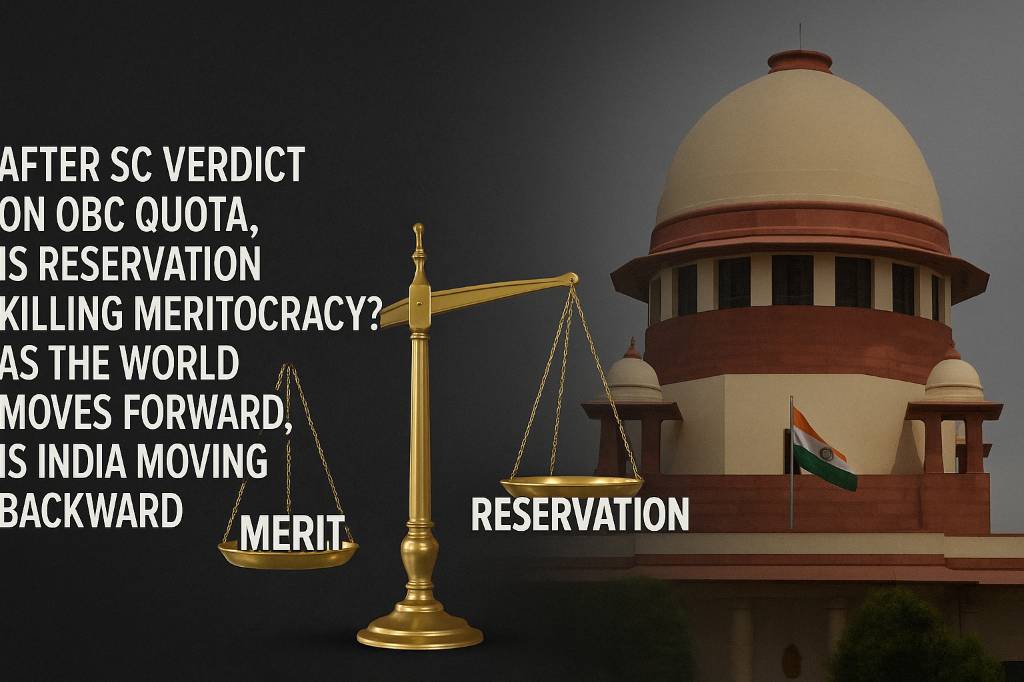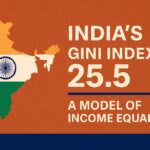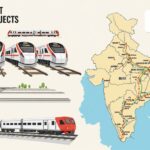
New Delhi, July 5, 2025– The recent decision by the Supreme Court to implement OBC reservation in line with the central government reservation rules has reignited a long standing debate: Is India sacrificing merit for social justice?
While the move is being celebrated by proponents of affirmative action, critics argue that expanding caste-based quotasespecially in the higher judiciary and elite institutions could cripple India’s merit-based ecosystem, hampering innovation, governance, and growth.
The Decision: A Quick Recap
The Supreme Court of India recently announced that it would now implement the 27% OBC reservation, in addition to the existing SC/ST quotas, for its administrative staff. This aligns with the central government’s reservation rules which mandate quotas in recruitment across central services.
Though constitutionally valid, critics warn the move might accelerate institutional decline by compromising meritocracy.
Merit vs. Reservation: An Unresolved Conflict
Reservation was introduced as a temporary corrective mechanism to address historical injustices. But over the decades, it has become a permanent fixture, and arguably, a political weapon. Detractors believe it has evolved into an entitlement system that overrides performance standards.
- Decline in Competence: Candidates selected via quota may not meet the expected thresholds.
- Demotivation of General Category Youth: Aspirants lose out despite outperforming in exams.
- Perpetuation of Caste Identity: Rather than uniting society, it reinforces caste consciousness.
Global Trends: The World Is Prioritizing Merit
Countries like China, Germany, Japan, and Singapore emphasize skill and qualification over community identity.
- China: Purely exam-based selection with no reservation system.
- Germany: Employment via vocational training and skill-based hiring.
- Singapore: Monitors race data but avoids fixed quotas.
India, in contrast, is expanding quotas to over 60% in some sectors. Is this helping us move forward—or anchoring us to old divides?
Institutions at Risk: Merit Under Siege?
If reservation penetrates elite institutions unchecked, the meritocracy in judiciary, education, and civil services may weaken.
Imagine:
- Courts managed by underqualified staff hired via caste quota.
- Medical colleges admitting students with 200–300 marks less than general candidates.
- Bureaucracies shaped more by social category than ability or efficiency.
Real-Life Fallout: Stories from the Ground
Take NEET or UPSC as examples:
- A general candidate with 650 in NEET may get no seat.
- A reserved candidate with 420 marks may secure a top government medical college.
This discrepancy leads to anger, alienation, and even reverse discrimination.
“Why should I study 18 hours daily if someone else will get my seat despite scoring 150 marks less?” – A NEET aspirant from Delhi.
The Political Angle: Vote Bank Over Vision
Reservation has become a vote bank tool rather than a social justice initiative. Political parties are in a race to appease caste blocks:
- Marathas, Patidars, Jats all demanding quotas.
- Supreme Court’s new move seen as a political compromise.
This raises a dangerous question—when politics captures the judiciary, what remains independent?
Economic Criteria Is a Better Path?
The 10% EWS quota is a move toward income-based affirmative action. Many argue this is more just and modern:
- Helps poor across castes.
- Targets actual disadvantage, not inherited privilege.
- Promotes unity instead of caste politics.
However, EWS remains a small portion, while caste-based reservations dominate recruitment and education.
What’s the Way Forward?
India needs a phased, modernized reservation policy:
- Sunset Clause: Time-limit caste-based reservations.
- Strict Creamy Layer Exclusion: Eliminate affluent quota beneficiaries.
- Merit-Reservation Balance: Especially in elite jobs and institutions.
- Invest in Education: Empower all castes from school-level.
Conclusion: Time for a National Debate
With over 70 years of caste based reservations, it’s time to ask –
- Are we still correcting historical wrongs or creating new ones?
- Is India prioritizing equality or enabling institutional decline?
- Are we building a merit-driven future or a divided past centric nation?
OBC reservation in the Supreme Court may be a legal move, but the moral and practical consequences deserve urgent national introspection. As the world leaps toward meritocracy, is India moving backward?
Stay Connected
For updates on OBC reservation, meritocracy debates, and Indian policy reforms, follow The News Drill:
- 📧 Contact us: contact@thenewsdrill.com
- 📢 Submit a story tip: editor@thenewsdrill.com or visit our Contributor Page
- 🔗 Follow us on X: @RSParihar_1
For more updates stay tuned with The News Drill.









